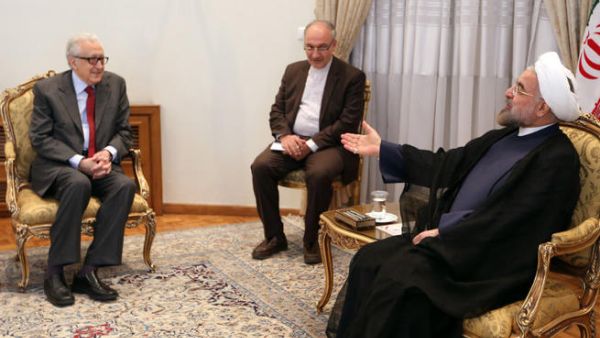The Supreme Military Council of the Free Syrian Army on Monday rebuffed the participation of Syria’s allies in the proposed Geneva II conference aimed to end the 31-month Syrian conflict.
“We will not sit down on the negotiation table with those who have blood on their hands. We consider Russia, China, Iran and [Lebanese Shiite group] Hezbollah as the regime’s partners,” FSA said in a statement.
While Hezbollah has sent fighters to battle rebels alongside Syrian President Bashar al-Assad’s forces, Russia and China have long vetoed resolutions threatening Damascus.
FSA said its conditions must be fulfilled if Syrian opposition to join the proposed peace talks.
“Geneva II lacks real incentives and a clear road map,” the statement said, adding that there needs to be guarantees from Muslim and Arabic countries before the start of the peace talks.
The rebel army said what has been agreed in Geneva I must be fulfilled before entering any negotiations. Geneva II is meant to decide on how to implement a declaration agreed by the major powers in Geneva in June 2012. The declaration stated that there should be a transitional government in Syria.
FSA said shelling against “Syrian cities and villages must stop; blockades on besieged areas must end.”
“Assad must cede power and his regime members must be tried for all the crimes they committed against Syrians, and transfer of power to form a transitional government must take place,” the statement added.
The rebel army’s statement comes after U.N.-Arab League envoy Lakhdar Brahimi arrived in Damascus on Monday, as part of the next leg of his regional tour to garner support for a peace conference on Syria.
Brahimi flew in to Beirut from Tehran and was to travel overland to Damascus the same day, making his first visit to Syria since last December, Agence France-Presse reported.
The envoy arrived at the Sheraton hotel accompanied by Syrian deputy foreign minister Faisal Moqdad.
In Tehran, Brahimi said it was “necessary” for Iran, a key ally of the Damascus regime, to take part in the Geneva II conference.
United Nations Secretary-General Ban Ki-moon is still to name a formal date for the proposed meeting despite comments from some Syrian and Arab nation officials suggesting the talks could be held late next month.
Russia and the United States have been pushing for peace talks to find a political solution in the Syria conflict but it has been repeatedly delayed.
On Monday, Russia described as “outrageous” a threat by Syrian opposition groups against those who attend Syria peace talks.
“It is outrageous that some of these extremist, terrorist organizations fighting government forces in Syria are starting to make threats,” Foreign Minister Sergei Lavrov was quoted as saying by AFP.
“The threats are directed at those who have the courage to attend the proposed Geneva conference being offered by Russia and the United States with the entire world’s support.”
A statement was released on Sunday by 22, mostly, Islamist brigades fighting to topple Syrian Assad saying the proposed conference “is not, nor will it ever be our people’s choice or our revolution’s demand.”
The opposition groups went on to say that anyone who attends such talks would be committing “treason” and “would have to answer for it before our courts,” according to AFP.
Under pressure from the West, the National Coalition opposition group is to meet on Nov. 9 to decide whether to take part in the peace conference.
But it has insisted it will only do so if there are guarantees Assad will step down, and its leader Ahmad al-Jarba has also said no talks can take place unless the regime frees women and children from its jails.








